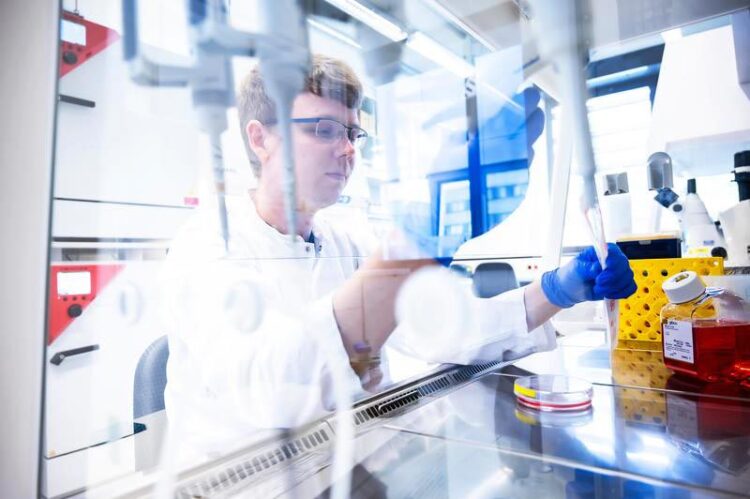New therapeutic approach for the treatment of neuroblastoma in young children

Lead author Sven Hagemann is handling cell cultures.
Credit: University Medicine Halle
Neuroblastomas are tumors of the nervous system. They can form in many places in the body and are the most common cause of cancer-related deaths in young children. A team of researchers at University Medicine Halle has discovered the processes involved in the development of neuroblastomas. The protein IGF2BP1 is considered the spark that can ignite a whole wildfire of cancer-causing processes. In preclinical trials, the team used a molecule that was able to inhibit IGF2BP1 and extinguish this spark. The results of this new potential therapeutic approach have been published in the journal “Molecular Cancer”.
The protein IGF2BP1 is present at the beginning of life and ensures that cells grow rapidly during embryonic development. Later on, its presence is linked to various tumors. In this current study, the researchers analyzed the genetic characteristics of the tumors of 100 children suffering from neuroblastoma, and performed extensive cell culture experiments and experiments on mice. “In short, IGF2BP1 causes that another protein is produced in abundance. Both proteins can activate various, currently unresolved, processes at the genetic level that have a strong cancer-causing effect under these abnormal circumstances,” explains Sven Hagemann, lead author and biochemist at the Institute of Molecular Medicine at University Medicine Halle. The result is an out-of-control conflagration in the cell, which causes neuroblastomas to form, survive, grow and spread. The study has shown for the first time that IGF2BP1 on its own is enough to trigger this tumor; all of the mice in which the protein IGF2BP1 was induced developed a neuroblastoma.
Targeted therapies are urgently needed
More than half of children with high-risk neuroblastomas relapse. Therefore, new therapeutic approaches are urgently needed to more effectively treat this type of childhood cancer. German Cancer Aid and the German Research Foundation provide funding for such projects at the University Medicine Halle with the aim of identifying the main drivers behind cancer and counteracting them using novel small-molecule drugs.
“It would be very promising to specifically inhibit IGF2BP1, since it is not normally produced after infancy – except in cancer cells,” explains Professor Stefan Hüttelmaier, director of the Institute of Molecular Medicine at University Medicine Halle. The team has now successfully tested such a molecule in close cooperation with the Institute of Pharmacy at Martin Luther University Halle-Wittenberg. “Our drug candidate has so far shown no adverse effects in initial preclinical trials and can be used as the basis of further developments. In the future, the targeted treatment of neuroblastomas could prevent patients from experiencing the severe side effects of chemotherapy,” says Hüttelmaier. However, it will take a few more years to clarify unresolved questions before clinical trials can begin. It is unclear, for example, why IGF2BP1 is present in the first place, or how the drug can best be delivered to where it is needed in the body.
Professor Hüttelmaier has been studying the protein IGF2BP1 for more than 20 years: “We began by studying neurons until we suddenly stumbled upon the fact that this protein is particularly prevalent in cancer.” Based on clinical data, Professor Hüttelmaier’s team was able to demonstrate in 2015 that IGF2BP1 plays a role in the development of neuroblastomas. “We have now succeeded in uncovering further pieces of evidence and, for the first time, we have identified a possible therapeutic approach. If we succeed in developing a suitable molecule, this will not only be relevant for neuroblastomas. Studies show that IGF2BP1 also plays a key role in other tumors,” says Hüttelmaier, looking ahead towards the future.
Wissenschaftliche Ansprechpartner:
University Medicine Halle
Institute of Molecular Medicine
Professor Dr. Stefan Hüttelmaier, Director
stefan.huettelmaier@medizin.uni-halle.de
Sven Hagemann M. Sc. Biochemistry
sven.hagemann@medizin.uni-halle.de
Originalpublikation:
Hagemann S, Misiak D, Bell JL, Fuchs T, Lederer MI, Bley N, Hämmerle M, Ghazy E, Sippl W, Schulte JH, Hüttelmaier S. IGF2BP1 induces neuroblastoma via a druggable feedforward loop with MYCN promoting 17q oncogene expression. Mol Cancer. 2023 May 29;22(1):88. doi: https://doi.org/10.1186/s12943-023-01792-0
Weitere Informationen:
https://www.umh.de/molmed Institute of Molecular Medicine at University Medicine Halle
Media Contact
All latest news from the category: Health and Medicine
This subject area encompasses research and studies in the field of human medicine.
Among the wide-ranging list of topics covered here are anesthesiology, anatomy, surgery, human genetics, hygiene and environmental medicine, internal medicine, neurology, pharmacology, physiology, urology and dental medicine.
Newest articles

Largest magnetic anisotropy of a molecule measured at BESSY II
At the Berlin synchrotron radiation source BESSY II, the largest magnetic anisotropy of a single molecule ever measured experimentally has been determined. The larger this anisotropy is, the better a…

Breaking boundaries: Researchers isolate quantum coherence in classical light systems
LSU quantum researchers uncover hidden quantum behaviors within classical light, which could make quantum technologies robust. Understanding the boundary between classical and quantum physics has long been a central question…

MRI-first strategy for prostate cancer detection proves to be safe
Active monitoring is a sufficiently safe option when prostate MRI findings are negative. There are several strategies for the early detection of prostate cancer. The first step is often a…



